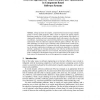Free Online Productivity Tools
i2Speak
i2Symbol
i2OCR
iTex2Img
iWeb2Print
iWeb2Shot
i2Type
iPdf2Split
iPdf2Merge
i2Bopomofo
i2Arabic
i2Style
i2Image
i2PDF
iLatex2Rtf
Sci2ools
139
Voted
QOSA
2010
Springer
2010
Springer
A Hybrid Approach for Multi-attribute QoS Optimisation in Component Based Software Systems
Design decisions for complex, component-based systems impact multiple quality of service (QoS) properties. Often, means to improve one quality property deteriorate another one. In this scenario, selecting a good solution with respect to a single quality attribute can lead to unacceptable results with respect to the other quality attributes. A promising way to deal with this problem is to exploit multi-objective optimization where the objectives represent different quality attributes. The aim of these techniques is to devise a set of solutions, each of which assures a trade-off between the conflicting qualities. To automate this task, this paper proposes a combined use of analytical optimization techniques and evolutionary algorithms to efficiently identify a significant set of design alternatives, from which an architecture that best fits the different quality objectives can be selected. The proposed approach can lead both to a reduction of development costs and to an improvement of th...
Analytical Optimization Techniques | Component-based Systems Impact | QOSA 2010 | Single Quality Attribute | Software Engineering |
Related Content
| Added | 14 Feb 2011 |
| Updated | 14 Feb 2011 |
| Type | Journal |
| Year | 2010 |
| Where | QOSA |
| Authors | Anne Martens, Danilo Ardagna, Heiko Koziolek, Raffaela Mirandola, Ralf Reussner |
Comments (0)

